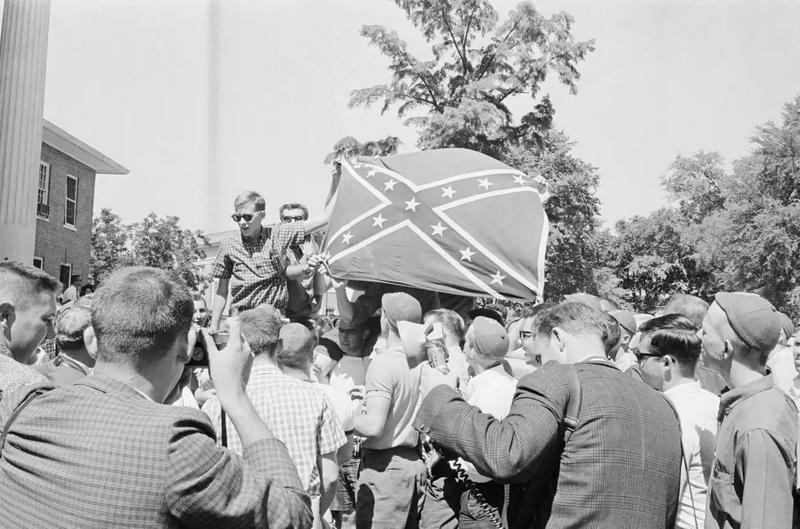The 1962 University of Mississippi Riots That Changed The World
By | September 4, 2021

The 1962 riots at the University of Mississippi campus marked a turning point for racial equality in the region. For a state that featured the confederate emblem on their state flag well into the 21st century, progress came slowly. Nevertheless, the enrollment of James H. Meredith due to clerical oversight set off a chain of events that rocked Ole Miss to its core. A showdown between President Kennedy and Mississippi Governor Ross Barnett, highlighted by a fiery call to arms before a football game, ended with two dead and hundreds injured.
Angry segregationists clashed with U.S Marshals, the Mississippi National Guard, and Army troops. Despite the mass violence, Meredith’s enrollment proceeded, marking the historic integration of the University of Mississippi.

Clerical Integration
Amazingly these brutal riots protesting integration all started due to clerical oversight. James Meredith’s application received a stamp of approval by someone who thought he was white. Simply his name accompanied by “former servicemen of the U.S. Air Force” leaves his race ambiguous. However, when the registrar did learn of his ethnicity, they attempted to revoke his admission. That of course, led to a court case.

JFK Vs. Mississippi Governor Ross Barnett
When Federal courts ruled that the University must uphold their original acceptance, allowing Meredith to enroll, the tension began to build. Mississippi Gov. Ross Barnett himself declared, "I'm a Mississippi segregationist and I am proud of it. I love Mississippi! I love her people, our customs. I love and I respect our heritage."
Privately, the Governor looked for an out with President Kennedy. Unfortunately, for him and segregationists, Kennedy demanded federal law be upheld. In a phone call, the President did tell Barnett, "What I'd like to do is for this to work out in an amicable way. We don't want a lot of people down there getting hurt."

Line In The Sand
Lamentably, the governor decided to go another way. Before a ginned up crowd at an Ole Miss football game, Barnett set fire to the powder keg. History professor Chuck Ross and director of the African-American Studies Program at Ole Miss called Barnett’s speech "almost like firing on Fort Sumter in 1861." He went on to describe it as "A call to arms ... 'We're getting ready to be invaded, we really want you as a Mississippian, a white Mississippian, to respond.”
On Saturday, September 29 federal marshals arrived in Oxford Mississippi to prepare for the reaction to Meredith’s arrival. 500 federal marshals escorted him to his dorm room while thousands of rioters gathered around the University. By nightfall, a full-on riot broke out. Students, Ku Klux Klan members, and Oxford residents threw rocks and bottles before opening fire. French journalist Paul Guihard and 23-year-old Ray Gunter, a white jukebox repairman, died in the melee. Hundreds suffered grievous injuries before 3,000 soldiers enforced the peace on October 1.

Aftermath
As Marleah Kaufman Hobbs remembered, “The cracking of the guns, the planes flying overhead bringing in more National Guard. We didn't sleep at all that night. It was the changing of the world." Bishop Duncan Gray Jr., then an Episcopal priest in Oxford, felt "It was a horrible thing, and I'm sorry we had to go through that, but it certainly marked a very definite turning point. And maybe a learning experience for some people. I think even the ardent segregationists didn't want to see violence like that again."
However, the man at the center of the maelstrom, who endured racial isolation to graduate, doesn't see it through such rose-colored glasses. "You know, I got a degree from Ole Miss in political science, history, and French. I ain't never heard of a Frenchman celebrating Waterloo," Meredith says. "They not only kept me out ... they kept all of my blood before me out forever, and I'm supposed to celebrate that?"
The man who changed the world said he attended the university because he "was born in Mississippi and personally never lost the idea that it belonged to me and my kind. The reason Ole Miss was established was to refine and define and perpetuate the theory of white supremacy," he says. It was the Ivy League of the Southern way of life."
